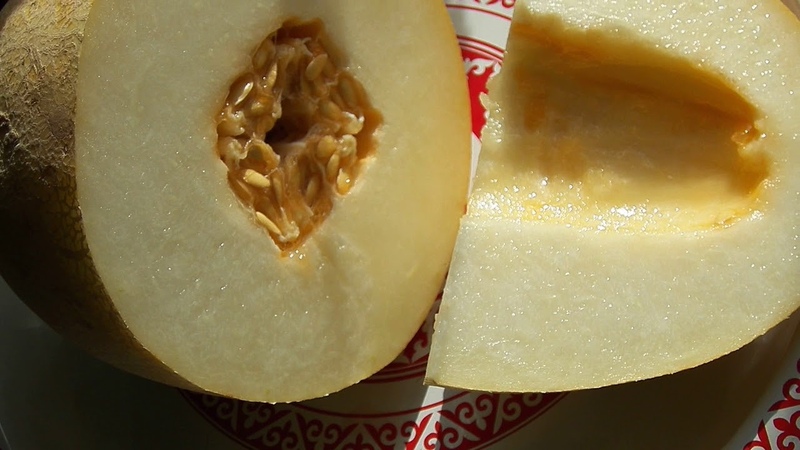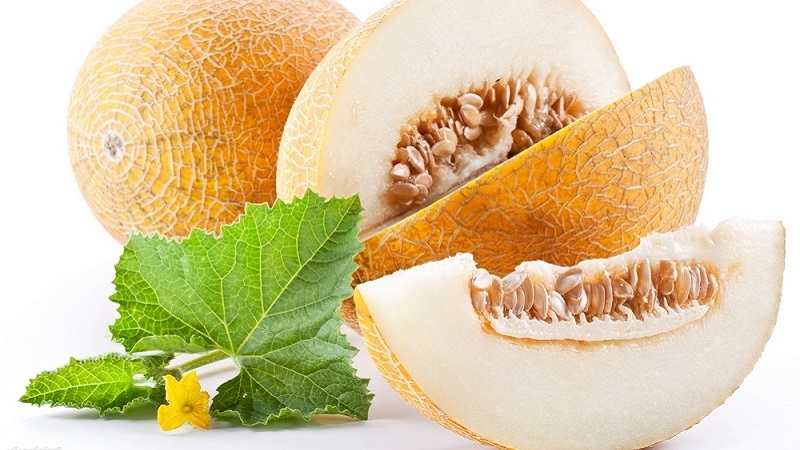Why melon smells like acetone and can you eat it
Sweet, aromatic melon is one of the best desserts. The honey fruit came to us from hot Asia. More than a hundred are grown in Uzbekistan varieties this culture.
However, it happens that a store-bought or home-grown treat doesn't live up to expectations. Sweet slices disappoint with an unpleasant acetone aroma and a strange taste. In the article, we will figure out why the melon smells like acetone and whether such a vegetable can be eaten.
The content of the article
Melon acetone taste and smell
Acetone flavor appears for a reason. This phenomenon has definite reasons. An off-taste can appear on the fruit as a result of improper care during cultivation, for example, applying too much fertilizer to the soil.... Or treating fruits with chemicals during storage and transportation of melons to the point of sale. However, this is not a complete list of reasons.
Probable consequences of eating acetone-smelling fruits

If the product looks good, there are no signs of spoilage, but there is a persistent smell and taste of acetone, that is, it is still not worth it. The chemicals used to treat the fetus can cause the disorder stomach or even poisoning.
Attention... At the end of the melon season, in the second half of September, melons are often treated with chemical compounds to prevent spoilage.
The risk of poisoning increases when purchasing melons after the end of the season. Pregnant and lactating women should be especially careful when consuming melons. Melon with the taste and smell of acetone is extremely dangerous for the child's body.
The following process leads to the appearance of the taste and smell of acetone:
- In order for the delicate fruits to undergo transportation well, they are removed from the garden before the onset of technical ripeness. Melons ripen in unnatural conditions for them.
- Unsuitable conditions for ripening (too high temperature) and the sugar content of the pulp lead to the fact that the fermentation process begins in the fruits. The result of fermentation is the formation of alcohols.
- With further storage of fermented fruits, alcohol is oxidized. During oxidation, aldehydes are formed, and then ketones. A typical saturated ketone is acetone. Fermented pulp begins to smell like acetone.
This unpleasant phenomenon happens not only with sweet melon, but also with some fruits, such as bananas.
But it happens that a melon without signs of rotting, with dense pulp, without damage gives off a pungent smell of alcohol. In this case, the reason for the unpleasant taste and aroma lies in the processing of the fruit with chemicals. Vegetables and fruits processed by special chemistry are distinguished by good keeping quality and attractive appearance, however, it is unsafe to eat such fruits.
Varietal features
Judging by the reviews of those who have encountered a similar problem, the taste and smell of acetone is most often found in melons of the variety Torpedo... This kind of culture will sing at the end of August, but Torpedo is sold in stores until early October.
Distinctive features of the variety:
- oblong shape;
- average fruit length is about 30 cm;
- weight from 5 to 15 kg;
- the skin of the fruit is covered with a network of veins.
Torpedoes have relatively good keeping quality and carry transportation well. But the shelf life of the delicacy is very short, so you should not purchase Torpedoes after the end of the season.
Is it possible to eat such a melon
So, there are two possible reasons for the acetone taste and melon smell:
- Overripe fruits have an unpleasant odor. Melons ripening in the plucked form (as well as bananas, mango, pomelo) begin to ferment. During fermentation, the sweet fruits digest themselves. Overripe melons are distinguished by soft skin and friable flesh that spreads from pressure.
- Acetone tastes and smells caused by chemicals... Chemically, the fruits are treated during growth, as well as after removal from the garden to extend the shelf life.
Can you eat a melon with the smell of acetone? Not. If the melon has fermented, it means that bacteria multiply in it and their waste products accumulate.
If the unpleasant taste and smell is caused by an excess of fertilizers or processing with chemical compounds, then it is also unsafe to eat such fruits. Such a product will cause stomach upset or even poisoning. An excess of nitrates is indicated by grayish and empty melon seeds, the absence of a pronounced melon aroma.

Selection recommendations
Distinguishing a ripe and tasty product from a dangerous one is not difficult:
- To begin with, the fruit is sniffed... Melon ripened in the garden exudes a delicate sweet aroma. If there is a herbal odor or none at all, the melon is unripe.
- Then the melon carefully examine. The peel should not have any mechanical damage, dents or cuts. Correct color - uniform, without green streaks and spots. Blue and pink spots indicate the use of aerosol-type preservatives. The color of a healthy fetus is even, without pigmentation.
- Melon peel must be felt. The palpably hard to the touch the fruit is unripe, and the soft is overripe. When pressed with a finger, the surface should spring, and not spread. When tapping on a ripe fruit, a dull sound is heard.
You should not buy melons from busy roads, parking lots and other polluted and gas-polluted places. It is dangerous to buy cut melons.
Read also:
What vitamins are in melon and how it is useful for the body.
Conclusion
The smell and taste of acetone in a melon indicates that the product is overripe and fermented. Or the fruits are treated with chemicals. And in fact, and in another case, such a delicacy is dangerous.
To avoid poisoning, inspect and touch melon fruits carefully before purchasing. Purchase the product from trusted individuals who are personally involved in the cultivation of melons.